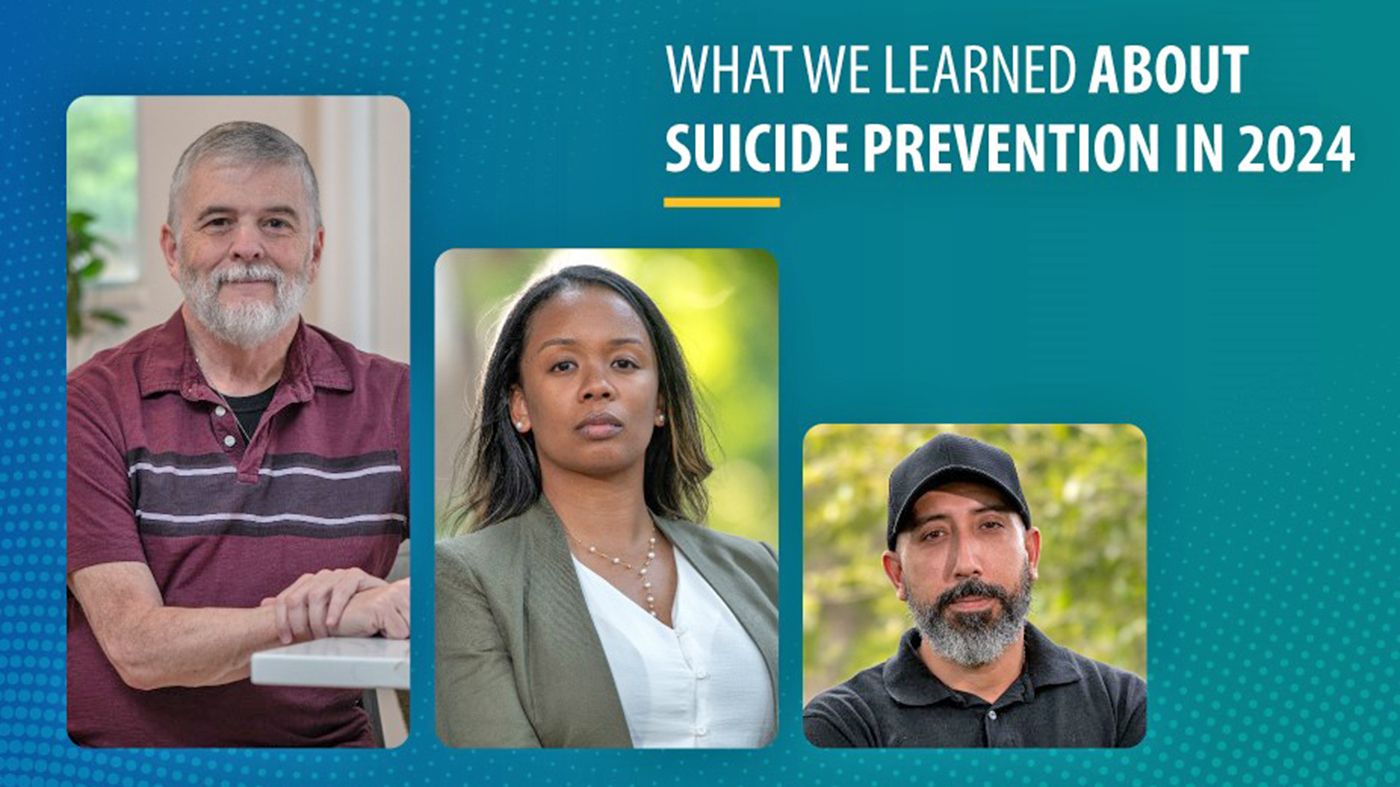Throughout 2024, we shared information about Veteran suicide prevention, the Veterans Crisis Line and VA resources, programs and initiatives. All these articles were connected by our main tenets of suicide prevention:
- Suicide is preventable.
- You don’t have to be an expert to help a Veteran going through a challenging time, you just need to show genuine care and concern.
- You don’t have to be enrolled in VA health care or benefits to use many of our resources.
- There is hope.
If you didn’t have a chance to read all our articles this year, not to worry. Here’s a recap of what we explored in 2024.
Suicide is preventable
A critical part of preventing a crisis is to be prepared, which includes understanding the resources available to you and how they work.
- What to expect when you connect with a suicide prevention coordinator (published Feb. 20) and Beyond the call: Understanding the Veterans Crisis Line (published Sept. 30) describe what happens when you contact a VA suicide prevention coordinator and Veterans Crisis Line responder, respectively. In sharing information about these types of resources, I hope Veterans and their family members will feel more comfortable in reaching out for support when they need it.
- Take the time: Reduce your risk of suicide crisis (published Aug. 19) focuses on how learning about lethal means secure storage practices through VA’s Keep It Secure program can reduce suicide risk.
You don’t have to be an expert to help a Veteran going through a challenging time
Some people think because they’re not a health care professional, they can’t help a Veteran facing a crisis. You don’t have to be an expert. You can help a Veteran by sharing suicide prevention resources, learning how to have a conversation with a Veteran about suicide and supporting them as they take steps to reduce their suicide risk.
- What to do if a Veteran you served with is talking about suicide (published Feb. 27) discusses steps to take if a Veteran you care about is having thoughts of suicide.
- Six ways anyone can start the conversation with a Veteran about suicide (published April 16) provides guidance on how anyone can talk about it, and anyone can help someone who’s struggling with suicide.
- Being prepared for a suicide crisis (published July 22) focuses on learning to recognize crisis signs and warning signs and what to do if you notice them in yourself or a Veteran you care about. The article also discusses VA S.A.V.E. Training, which is designed to teach anyone who interacts with Veterans how to recognize warning signs of crisis and what to do to help a Veteran who may be at risk.
You don’t have to be enrolled in VA health care or benefits to use many of our resources
No matter if you’re enrolled in VA health care or benefits, your location, or what you’re experiencing, VA is ready to support all Veterans.
- Help for Veterans facing thoughts of suicide (published April 23) focuses on how Veterans transitioning from service can strengthen or build a support system through resources offered by VA and Veteran-centric organizations.
- No matter what, VA is here for you (published July 13) reinforces VA offers a range of resources to support Veterans at any stage of their life, wherever they live, and however they served.
There is hope
One of the main ideas I wanted to convey with these articles over the last year is that suicide is preventable, and there is hope.
- Veterans: Embrace change and find hope this spring (published March 28) talks about how if a Veteran is facing dark times, like having thoughts of suicide, they might think they’ll never feel better. But with the right support, Veterans can embrace change and find a way forward.
- Five coping strategies for Veterans and their loved ones after a suicide attempt (published Aug. 9) focuses on the steps you can take on this journey of hope and healing.
- Flipping the script: Redefining how we look at Veteran suicide prevention (published Sept. 4) highlights that suicide isn’t the inevitable outcome if you’re going through a crisis.
The idea of hope is so important. What gives Veterans and their loved ones hope is that there are resources available and people who care about you and want to help. Now that you have a better understanding of what to expect, I encourage you to reach out.
If you’re going through a tough time or know a Veteran who is struggling, contact the Veterans Crisis Line—Dial 988, then Press 1, chat online at VeteransCrisisLine.net, or text 838255. We’re here for you whenever you need us. As I wrote earlier this year: You, and your story, matter.
Topics in this story
Link Disclaimer
This page includes links to other websites outside our control and jurisdiction. VA is not responsible for the privacy practices or the content of non-VA Web sites. We encourage you to review the privacy policy or terms and conditions of those sites to fully understand what information is collected and how it is used.
More Stories
Columbia VA’s pain program addresses not only the physical aspects but also the emotional and psychological factors.
Don’t let COPD hold you back. Reach out today for screenings and support and take control of your lung health.
Your breath is the most loyal friend you've always had. Connect, calm and heal with mindful breathing in this week's #LiveWholeHealth practice.







Thank You VA for this amazing Compassion shown toward all of our Brothers & Sisters, this is a for real issue in our World